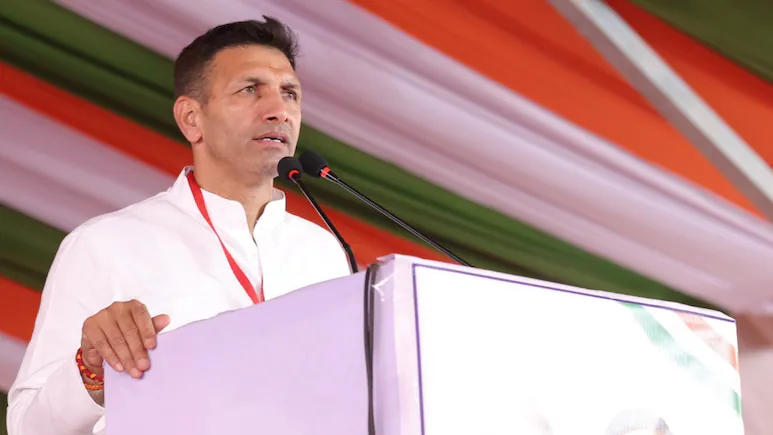Case Unfolds Amid Controversial Claims of Feces Feeding in Orchha
New Delhi: In a shocking turn of events, Madhya Pradesh Congress President Jitu Patwari is embroiled in a legal case that has raised concerns about political manipulation and the spreading of false narratives in the region. The allegations stem from a viral incident on June 25, where two villagers from Moodrara Badwah, Gajraj Lodhi and Raghuraj Lodhi, claimed during a press conference that they were assaulted and forcibly fed human excreta by a fellow villager, Vikas Yadav. This bizarre and distressing assertion has drawn national attention and outrage, prompting officials to take action.
The situation escalated when, just a day after their sensational claims, the Lodhi brothers retracted their statements in affidavits submitted to the Ashoknagar Collector. They clarified that while they had indeed faced physical assault from Yadav and his associates, the allegation of being forced to consume human waste was entirely fabricated. As per the report by[Times of India](https://timesofindia.indiatimes.com), the brothers claimed that Patwari had lured them into making these allegations, promising incentives such as a motorcycle and financial support.
This incident unfolded during a press conference orchestrated by Jitu Patwari in Orchha, where political narratives often collide with personal grievances. In light of the startling retractions, Mungaoli Police Station In-charge Jogendra Singh Yadav has registered a case against Patwari, citing attempts to incite communal tensions through manipulated statements. The FIR implicates Patwari directly, alongside unnamed local Congress leaders who may have played a role in facilitating this political theater.
Context and Implications of the Case
The political backdrop of Madhya Pradesh is characterized by fierce rivalries and an electorate that has been highly polarised in recent years. In this climate, allegations of this nature not only undermine the credibility of respective parties but also cast a shadow over the integrity of political discourse in the country. The villagers’ claims, especially the grotesque nature of being fed excrement, have the potential to stir community unrest, making the stakes even higher for all parties involved.
The Lodhi brothers’ initial involvement and subsequent withdrawal of their claims raise questions about the motivations and pressure tactics that may exist in political environments. The affidavits allege coercion and manipulation by Patwari, suggesting a calculated move to leverage the villagers’ grievances for political gain. This revelation adds a new layer of complexity to the already contentious relationship between local political figures and community leaders.
Local authorities have taken swift action to investigate the matter, which could lead to further examination of broader issues of political misconduct and community welfare in Madhya Pradesh. As these developments unfold, it raises the question: how deeply rooted are manipulative practices in the political arena, and what measures can be instituted to protect vulnerable communities from exploitation?
Political Repercussions and Community Impact
Political analysts and observers are closely monitoring the situation given its potential impact on the Congress party’s standing in Madhya Pradesh. Jitu Patwari, who has been a vocal critic of the ruling government, may face significant backlash within his party as well as from opposition groups. The Congress party, which has faced its share of challenges in maintaining its relevance in state politics, may struggle to regain public trust if Patwari cannot effectively clear his name.
Moreover, the community’s response to these developments will be crucial. Villagers and local leaders may react strongly, either supporting Patwari or siding with the Lodhi brothers, depending on how the narrative continues to evolve. Given the highly sensitive nature of caste and community relations in India, this case could have far-reaching consequences, either exacerbating existing tensions or prompting calls for greater accountability and transparency in political dealings.
Additionally, the incident underscores the need for a more robust framework to ensure that political claims are scrutinized adequately. The legal action initiated against Patwari could serve as a precedent for similar cases, potentially deterring political manipulation in the future.
A Call for Accountability and Ethical Politics
The unfolding situation in Madhya Pradesh serves as a reminder of the importance of ethical conduct and accountability among political leaders. The alleged coercion of the Lodhi brothers raises broader concerns about the manipulation of vulnerable populations for political advantage. As citizens become more aware of these tactics, there is a growing demand for transparency and ethical behavior from elected officials.
In the wake of the allegations, it is critical for political parties to reflect on their strategies and the implications of their actions. Engaging with communities in a genuine, respectful manner fosters trust and collaboration rather than the divisive tactics that can lead to scandals such as this one.
Furthermore, civil society and the media must play an active role in holding leaders accountable for their actions while ensuring that the voices of the marginalized are heard and respected. By doing so, they can contribute to a political culture that prioritizes truth and integrity over sensationalism and conflict.
The case against Jitu Patwari may just be the tip of the iceberg in addressing deeper systemic issues within the political framework of Madhya Pradesh and, by extension, India. As discussions continue, it remains to be seen how this situation will influence the larger political narrative as well as the future of ethical governance in the region.
DISCLAIMER
We have taken every measure to ensure that the information in this article and on our social media platforms is accurate, verified, and obtained from reliable sources. For feedback or complaints, please contact us at info@hamslive.com.


